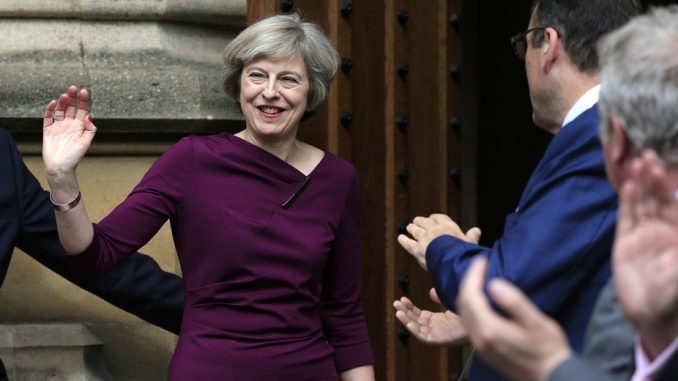
Originally appeared at A-specto, translated by Valentina Tzoneva exclusively for SouthFront
Theresa May will inherit the post of David Cameron, who resigned due to the results of the referendum for leaving the EU. Andrea Leadsom today withdrew from the competition for the leading post in the Conservative Party. The last opponent of May took the second position, after the primaries of the parliamentary party as she quickly realized that she has the support of less than 25% of the MPs.
Leadsom announced that the interest of her country inspired her to compete for the leading post, as well as her expectations for a bright future for Great Britain after the withdrawal from the EU. She underlined that the results from the referendum demonstrate the clear will for a change. Leadsom added that now the country needs a strong leadership which is able to make quick decisions and start negotiations for Brexit, which will guarantee stability for business and follow the clear instructions deriving from the results of the referendum. In this way, Leadsom gave her full support for Theresa May, who received 60% of the votes of the MPs.
By giving up the competition, Leadsom cleared the road for Theresa May not only for the leading position with the Conservatives, but for the post of Prime Minister. The Home Office Minister announced that if she becomes Prime Minister, two major principles would be leading in the negotiations for exiting the EU: to protect the interests of the British business and enforce the control on the borders of the country.
There are a few possible scenarios after the withdrawal of Leadsom. The analysts think that it is quite possible for the Home Office Minister to be approved as the leader of the Conservative Party, and David Cameron to retire from his post within weeks, and not in October as he previously planned.
According to other experts, we must not exclude the option in which the supreme body of the Tories proposes another contender for the post. Michael Gove appears as an alternative candidate, who came third in the second round of the primaries in the Conservative Party. This will mean that on the 9th of September, when by rules the successor of Cameron should have been elected, they will either vote for May or Gove. Keeping in mind that Gove already gave his support to May, this is less likely to happen.
At the same time, Angela Eagle, announced the she will face Jeremy Corbin in the battle for leadership in the Labour Party. Some media joked that she has chosen the worst possible moment to announce this, due to the dramatic announcement of Leadsom.
“I would not have done it if I did not believe that I have something to give for the unification of the Party and the country, too,” commented Eagle and declared that she would also become a candidate for the post of Prime Minister of Great Britain.
Hours after Angela Eagle made this statement, it became clear that she could follow the fate of Jeremy Corbin and also face a no-confidence vote by the Labourists.
This point was reached after 172 MPs of the British opposition party voted for the removal of their leader from his post. Before the no-confidence vote, some Labour-members had already consulted with their lawyers. The cause that has been discussed was whether the leader has an automatic right for a second round in the election of a leader, as they have faced ambiguous wording in the rules of the party. Corbin himself said that he will oppose any attempt to take him out of the competition for a new leader of the Labour, although the rules of the party do not say whether his name can be included in the voting list automatically.




Very demonic looking.
A hopeless analysis. . . . . . . . ..
The Leader of the Conservative Party is chosen by a ‘knockout’ competion with the candidate with the least votes being eliminated at each successive vote. Crabb went first, then Fox, then Gove. The ‘Final’ was between May and Leasom and Leasom stood down, leaving May unchallenged for the Leadership.
The ‘Sumpreme Leadership’ of the Tory ‘The 1922 Committee’ immediately ratified the appointment of May, elmiminating all possibility of a challenge. The swift and decisive action of the 1922 Committee and actions of Leasom, indicate that May has the full support of the Tory Party establishment and she is unchallengable as a leader.
While the Tory Party was divided in the Parliment Chamber, the ‘Cameron, Remain’ faction has firmly re-established control after the Brexit vote and the rebels, although they won the Brexit vote have lost all power as a consequence.
The situation in the Labour Party is different. The Leader of the Party, Corbyn was elected by the membership of the Party against the wishes of the elected representatives. The elected representatives have sought to remove him from the moment he was elected. The Brexit vote gave them the pretext to mount a coup against him.
Unlike the Tory Party Leader, the Labour Party Leader is elected by the entire membership, not just the representatives in Parliment. Approximately 75% of the representatives in Parliment want to remove him while it seems about 75% of the membership wishes him to remain. If the vote takes place and Corbyn is removed 75% of the elected representatives will have no political support from the party and will be removed. Corbyn and the membership are Socialist, with agenda of State control and if this happens there will be a dramatic change in direction in British politics.
If Corbyn loses the vote (and it looks unlikely) the party will lose support from both the Trade Union Movement and the membership and be much weakened.
The wife of a banker.
The banks seem to be installing their people into critical positions, Clinton in the US and May in the UK.